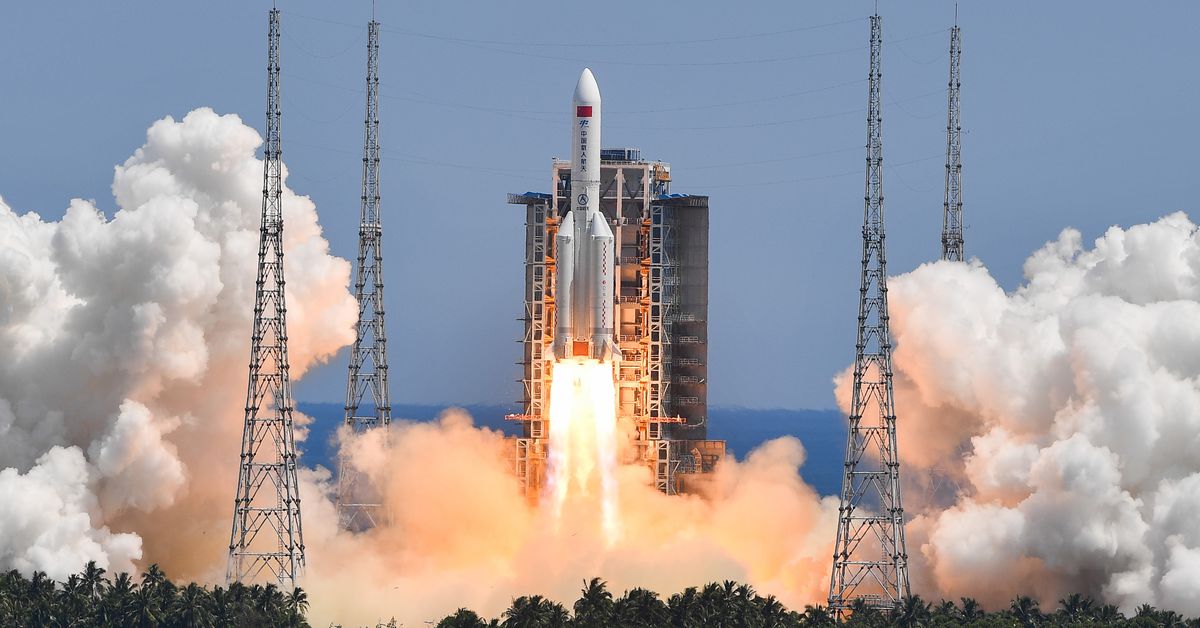
China’s uncontrolled Long March 5B rocket reentered the Earth’s atmosphere over the Indian Ocean, landing somewhere near Sarawak, the Malaysian state on the island of Borneo.
The US Space Command confirmed the rocket’s reentry at 12:45PM ET, but it remains unclear where its debris landed. In a translated post on Weibo, China’s Manned Space Agency said the rocket reentered near the same area, and that most of it burned up on its way down.
On July 24th, China used a Long March 5B rocket to launch a lab module to its unfinished Tiangong space station. Unlike most rockets, the Long March 5B thrusts its first stage into orbit when delivering its payload. This piece, which is over 100-feet-long and weighs over 22 tons, orbits the Earth for a bit until it comes crashing down to Earth, with no way to control its movement.
Uncertainty about where the rocket would land rippled across the globe this past week, as projections had the rocket landing anywhere from Mexico to the southern tip of Africa. This is China’s third Long March 5B launch, marking its third out-of-control landing. In 2020, China used a Long March 5B to bring Tiangong’s core module to space. Debris from the rocket landed in the Ivory Coast, and while no injuries were reported, there was some structural damage. Last year, China launched its first lab module aboard a Long March 5B, the pieces of which ended up splashing down into the Indian Ocean.
Reentry looks to have been observed from Kuching in Sarawak, Malaysia. Debris would land downrange in northern Borneo, possbily Brunei. [corrected] https://t.co/sX6m1XMYoO
— Jonathan McDowell (@planet4589) July 30, 2022
Malaysian users on Twitter captured the rocket’s apparent reentry, with some believing it to be a meteor. Jonathan McDowell, an astrophysicist at the Harvard-Smithsonian Center for Astrophysics, believes debris from the rocket could end up near Sibu, Bintulu, or Brunei — three cities located along the northern coast of Borneo — but believes it’s “unlikely” that it landed in a populated area.
NASA administrator Bill Nelson responded to the uncontrolled landing in a statement on Twitter. “The People’s Republic of China did not share specific trajectory information as their Long March 5B rocket fell back to Earth,” Nelson writes. “All spacefaring nations should follow established best practices, and do their part to share this type of information in advance to allow reliable predictions of potential debris impact risk, especially for heavy-lift vehicles, like the Long March 5B, which carry a significant risk of loss of life and property.”
Unfortunately, this isn’t the last out-of-control rocket set to come crashing down to Earth. China’s planning to launch its third and final module to Tiangong using a Long March 5B in October, and will use the rocket once again to bring a telescope to space in 2023.
https://www.theverge.com/2022/7/30/23285239/china-uncontrolled-rocket-crashes-down-indian-ocean-long-march-5b-borneo

